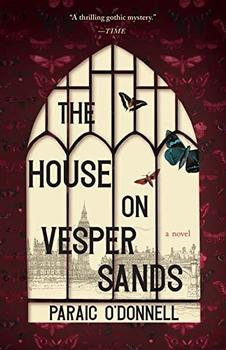Summary | Excerpt | Reading Guide | Reviews | Beyond the Book | Readalikes | Genres & Themes | Author Bio

When they reached it at last, the uppermost floor was in darkness as always. The landing was no more than a narrow passage, unfurnished save for a table and chair by the door of the workroom. It was here that Mr. Carew stationed himself while Esther was occupied within. As was her habit, she waited at the head of the stairs, following only when he had lit the modest lamp on the table and lowered himself to his seat.
"There now, Miss Tull," he said, examining a handkerchief that he had put to his brow. "Our penance is done for another day. Your present commission is to be completed tonight, I gather, and then we may hope for a few weeks of ease. Do you know what Lord Strythe says of us?"
Esther shook her head, though she knew very well. This exchange was repeated on each occasion, with hardly a word altered in its sequence.
"He says that we must be quite the pair of alpinists by now, and fit to scale any peak in Europe." He set his hands on his midsection, as if to contain his merriment. "Quite the pair of alpinists. Oh, dear me."
He waited, and Esther made a small show of amusement, prompting a sudden blossoming of pain. She brought in her elbows, raising her case a little before her.
"Oh, he is a great wit," Mr. Carew continued. "A great wit. Keep an eye on Miss Tull, he says, for she has the indomitable spirit of the mountaineer. At any moment, she might bound away to make an attempt upon the Matterhorn. And do you know, I think he may be right. But you will not bound away just yet, Miss Tull?"
She looked down at the handle of her sewing case, which she gripped so tightly now as to whiten her knuckles. "I am very tired, Mr. Carew, and I fear there is a long night ahead. I understand that there is—that there are new measurements. There is always a great deal to be done when the measurements are altered on the last night."
He said nothing, but looked for some moments over her person, as if making a careful inventory.
"It is an elaborate garment," she added. "It calls for a good deal of fine work."
He would hear the unease in her voice, surely, if she had not betrayed herself with some other sign. She had felt something again, a quick coursing against her skin. It would show somewhere. He would see.
"Quite right, Miss Tull," he said at length. "Lord Strythe is particular in his requirements, as you need not remind me. I will not keep you from your work any longer than can be helped. But before we go in, I will trouble you to open your sewing case and lay out what is in it." He swept his forearm across the yellowish tablecloth as if to clear a space, though it was bare save for the lamp. Then he settled himself in his chair with a look of complacent expectation.
"What is in it." She repeated the words as if she were a simpleton, and was conscious of a faint rasp of effort in her voice. To add to her other discomforts, she now felt a tightness take hold of her face and neck.
"You do not seem quite yourself this evening, Miss Tull. Yes, lay out what is in your sewing case, please. We will do the same again when you are leaving. It is no great novelty, surely? How am I to know you have taken nothing if I do not know what you had going in?"
"It has been some time, Mr. Carew. I had thought that perhaps ..."
"That perhaps we had come to trust you again. His Lordship is a reasonable man, Miss Tull, but he is not a fool. It has hardly been a month since we discovered those items among your belongings."
"I meant only to finish that piece of work at home, Mr. Carew. I knew it would be missed. What else could I have intended? What do you take me for?"
Carew drew himself up at this. Esther shrank from him, though she knew his outrage was feigned. She had not meant to say so much.
"You forget yourself, Miss Tull," he said. "You have been accused of nothing. Not lately, at least. His Lordship's instructions were plain, all the same. Nothing is to be brought beyond what is needed from your sewing box, and above all nothing is to be taken away. Lord Strythe believed he had made himself understood. But perhaps he had not."
Excerpted from The House on Vesper Sands by Paraic O'Donnell. Copyright © 2021 by Paraic O'Donnell. Used with the permission of the publisher, Tin House. Copyright © 2020 by Paraic O'Donnell.




Use what talents you possess: The woods would be very silent if no birds sang there except those that sang best
Click Here to find out who said this, as well as discovering other famous literary quotes!
Your guide toexceptional books
BookBrowse seeks out and recommends the best in contemporary fiction and nonfiction—books that not only engage and entertain but also deepen our understanding of ourselves and the world around us.